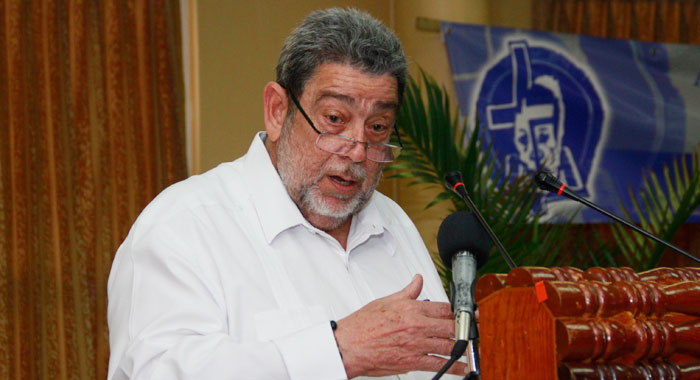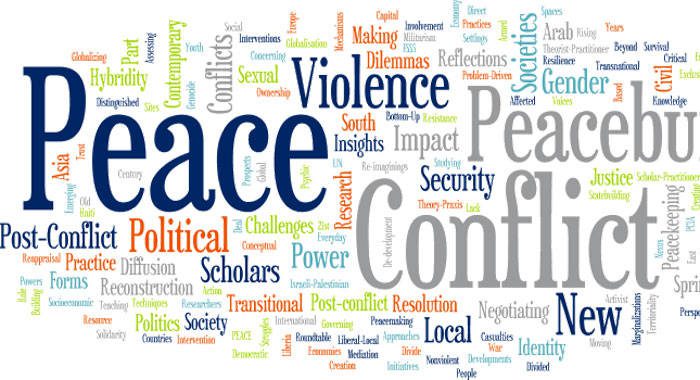As St. Vincent and the Grenadines (SVG) strives to address the issue of crime and violence, the question is not so much building a culture of peace, says Prime Minister Ralph Gonsalves.
“I have no doubt that such a culture exists in our country. It is to build it further,” he told the opening on Wednesday, in Kingstown, of the two-day “National Conversation on Crime and Violence”, organised by the SVG Christian Council.
“The issue to broaden, deepen, consolidate and strengthen the culture of peace that already exists and to ensure that the rupturing of this culture by violent murders or other forms of violence is reduced to the most minimal extent possible or tolerable in a civilised society. Currently, the extent of this rupture is unacceptable and intolerable,” Gonsalves said.
He said the overall strategic response to the problem of crime is to connect to strengthening, maintaining and sustaining the highest practicable levels of social order in a free and democratic society.
What is critical is the question of why are some individuals more likely to commit crimes, the prime minister said, adding that a credible search for an answer to this question requires multi-disciplinary approaches ranging over the field of the social sciences, including psychology, the medical sciences, and, among other disciplines, theology.
“The answer is not easy to locate precisely. A facile answer or answers are likely to lead to programmatic actions, which may prove — there is a high probability that they may prove futile. And believe me, there are many facile theories which abound, some of which are borrowed wholesale without regard to context, comparative or historical analysis.”
Gonsalves said that most serious crimes are committed by young males.
“Persons who turn out to be violent criminals usually do not do well at school. Violent crimes are more commonly committed in urban or urban-connected centres than in rural communities.”

He said that violent criminals hail disproportionately from dysfunctional families and tend to live in marginal economic circumstances. Persons who gravitate to trafficking for supplying narcotics illegally invariably embrace gun violence in support of their illegal activities.
“I believe those things to be true. And if they are, we begin to see the complications. These assertions reflect the condition of human nature, as well as society’s conditioning and influences. I am not of the school who blame crime on everybody else other than the individual who commits it. Because if that were so, we wouldn’t try people for murders, we would try the society. And many persons tend to forget that, sometimes in an interest to score this or that convenient point in accordance with their agenda.
“The quest for answers prompts us not simply to reflect on the causes of crimes but, critically, the patterns of criminality, which are connected to the issue of causes of crimes but it is a much larger and prior question, the patterns of criminality,” Gonsalves said.
He said that having stated in a summary way how the society might identify certain patterns of criminality, it is also important and obvious to put in the mix the counter balancing assertion, which he said he believes to be true.
“… namely, most young males do not commit serious crimes. … Only a minority of persons who do not do well at school turn to violent crime. Urban youths are overwhelmingly creative and productive and most of them stand askance from crime. … Most persons who live in marginal economic circumstances do not turn to serious crimes for a livelihood. Only a small percentage of economically disadvantaged youth go to the selling of illegal drugs and embrace gun violence. Most persons who grow up in dysfunctional families do not commit violent crime. … And, violent crimes are committed by a tiny minority of persons in the society. … And we do accept that well educated persons from the middle class do commit violent crimes.
“These observations complicate the nature-nurture analysis of criminal behaviour to such an extent that certain professionals tasked with arresting criminal misconduct, insist that the causes of crimes are unique to the particular criminal offenders. Often, they tell you it is down to choice.
“The persons who are in here, the professional counsellors, more likely the prison wardens, people who have to, on an on-going basis, to interface with criminals, will tell you that it is difficult to construct a general theory of crimes, causes of crimes. Of course, some of them would go to the extent to tell you that it is well nigh impossible to define causation of crimes in a general way.”
The prime minister, however, said that the data suggest that general patterns of criminality are observable even though each criminal is different.
He said these and other considerations prompted his government to present to parliament in 2003 a 14-point strategy in addressing crime.
The strategy has been refined over the years and each strategic element has been fleshed out in practical programmatic actions, the prime minister said.







Why the negative disparity of crime today versa in the 50s 60s to 80s? There were many more dysfunctional families who lived in marginal economic circumstances during those times of which many did not do well in school, especially those of rural communities whose connected centres would have been the street junctions.
Yes I do agree that the most likely cause is to blame society. The question is; do we really have a free and democratic society? And how did we get to this stage of being more progressive but less trusting?
A lay-blame approach will defeat the drive to the reinforcement of ‘peace’ therefore, the most we can do is to rationalize on the possibilities of way forward.
Dysfunctional families occurred through systemic conditions of social inequities. Ultimately, the critical necessity of a multi-disciplinary approaches start at nurturing within the schools and favourably in all communities being rural, urban, affluent or impoverished, the importance of ensuring timely releases of education curriculums.
The epitomised condition to strengthened Peace will be enhanced through a society of entrusted freedom.
Excellent summary of a multi-faceted issue by the PM.
We must stop simplictily blaming poverty and unemployment as the only or even primary causes if only because we are wealthier today individually and collectively than 50 years ago with roughly the same unemployment rate among young males.
We must also stop simplicitly blaming individual governments in SVG if only because growing crime and murder rates are a pan-Caribbean problem.
Yes, it is not only poverty that causes crime, but it is an area where the government can be instrumental in correcting. I certainly blame the government as the main cause. Governments are not the country, nor are they the society but they are the custodians of society in the country where they are supposed to be leaders. Gonsalves seeks to mislead society by trying to indicate that his government has NO FAULT in the rise in crime when in fact is is more at fault than any other entity. The churches generally do their part in teaching morality and to resist the corporate-consumer notion the have, have, have, meaning buy, buy buy. Those that do not have the money go out and thief the money or the cell phones, laptops or whatever. Although basic family/societal wisdom has all but disappeared in many societies today, the entity that should see these trends and act like leaders to correct them is the custodians of society: Government. If they are not then they are mainly at fault because they are not doing their job. Although “idle hands are the devil’s workshop” and the government is supposed to provide an atmosphere where jobs can occur, this is not all. Do not let Gonsalves fool you so that instead of seeing he is most to blame, you complement him, make excuses for him and almost worship him and say how great and accomplished he is in spite of all his ruthlessness and bad decisions, (he is only an accomplished politician and that is not necessarily a compliment).
Jesus said “Know them by their fruits”…Look at the country and our PM’s fruits do not look very good.
I salute the SVG Christian Council for undertaking such an important role in our country. I am very proud that as Vincentians we can have such lively and valuable discussions on issues of crime.
I read many of these articles and the responses. I must say the discussions are indeed very positive. I have always felt that we are a special people but some way along the line we have allowed our social values to be compromised.
Lets keep the discussions alive and hope that we see a change in the direction of the institutions that are charge with the special role of Nation building. Thanks to IWitness News for such intelligently written articles. Lets keep the conversation going.